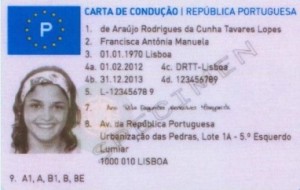Portuguese people are used to two different kinds of identification cards: the oldest kind is known as [o] bilhete de identidade (i.e. identity ticket/paper/card), which has been replaced by new card holders and renewals (from 2007) with a newer version known as [o] cartão de cidadão (i.e. citizen card).
This new version is not just an identity card, but actually a 4-in-one card: apart from the identity card, it replaces the health card ([o] cartão de utente, used to have access to the country’s national health service), the social security card ([o] cartão da Segurança Social) and the fiscal ID card ([o] cartão de identificação fiscal). Instead of having four different cards in your pocket, now you have just one, with the respective ID numbers of each former card placed in the front (personal ID) and the back (the other three) of the new one. It’s a much more convenient way to get by, especially when your wallet is already full of different cards!
In Brazil, the word used is [a] carteira de identidade; not a big difference, but still important just in case you want to be understood by a Brazilian Portuguese speaker.



